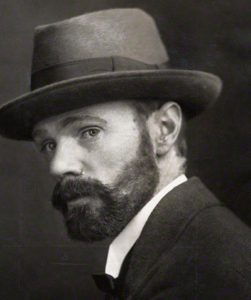Remembering D. H. Lawrence:
September 11, 1885–March 2, 1930
Greg Johnson
David Herbert Lawrence was born on September 11, 1885 in Eastwood, Nottinghamshire, England and died from tuberculosis on March 2, 1930 in Vence, France, at the age of 44.
The fourth son of a nearly-illiterate coal miner, Lawrence rose by dint of genius and hard work to become an internationally famous, often censored, and sometimes persecuted novelist, poet, essayist, and painter.
Underlying Lawrence’s writings was a visionary “vitalist” philosophy which affirmed the primary reality of life and criticized Christianity, science, technology, democracy, and feminism for suppressing, deforming, and profaning the life force.
Lawrence was also a man of the Right. A frank elitist, he rejected egalitarianism, liberalism, and democracy in favor of a hierarchical, organic society ruled by a dictator — a society that gave priority to aesthetic, cultural, and eugenic values. Lawrence also had strongly ecological and neopagan sensibilities.
Lawrence was astonishingly productive in his 44 years. His best-known novels are , Sons and Lovers, Lady Chatterley’s Lover, and The Rainbow. He also wrote numerous poems, short stories, essays, criticism, travelogues about Italy and Mexico, and many letters which were posthumously published.
To learn more about Lawrence, consult the following writings on Counter-Currents:
By Lawrence:
- “Benjamin Franklin”
- “D. H. Lawrence on Fenimore Cooper’s Leatherstocking Novels”
- “D. H. Lawrence on Fenimore Cooper’s White Novels”
- “D. H. Lawrence on Herman Melville’s Typee and Omoo”
- “D. H. Lawrence on Moby Dick”
- “‘The Great Death Continent’: D. H. Lawrence on America”
- “The Spirit of Place”
- “Things” (short story)
- “Whitman”
About Lawrence:
- Kerry Bolton, “D. H. Lawrence” (from Artists of the Right) (French translation here)
- Kerry, Bolton, “Rex Fairburn”
- Kerry Bolton, “Wyndham Lewis” (from Artists of the Right)
- Jonathan Bowden, “Elitism, British Modernism & Wyndham Lewis”
- Collin Cleary, “F. W. J. Schelling & Indo-European Triparition”
- Julius Evola, “The Enjoyment of Vulgarity”
- Derek Hawthorne, “D. H. Lawrence on America,” Part 1, Part 2
- Derek Hawthorne, “D. H. Lawrence on Idealism and Evil”
- Derek Hawthorne, “D. H. Lawrence on Men and Woman,” Part 1, Part 2, Part 3, Part 4, Part 5, Part 6
- Derek Hawthorne, “D. H. Lawrence on the Metaphysics of Life”
- Derek Hawthorne, “D. H. Lawrence on the Unconscious”
- Derek Hawthorne, “D. H. Lawrence’s Critique of Idealism”
- Derek Hawthorne, “D. H. Lawrence’s Critique of Modernity,” Part 1, Part 2
- Derek Hawthorne, “D. H. Lawrence’s Critique of Reductionism”
- Derek Hawthorne, “D. H. Lawrence’s Phallic Traditionalism”
- Derek Hawthorne, “D. H. Lawrence’s Women in Love: Anti-Modernism in Literature,” Part 1, Part 2, Part 3, Part 4
- James Holbeyfield, “Cosima Wagner,” Part 1
- Robert Steuckers, “Paganism and Vitalism in Knut Hamsun and D. H. Lawrence,” Part 1, Part 2
- Offa Whitesun, “Untainted Love”
Remembering%20D.%20H.%20Lawrence%3A%20September%2011%2C%201885%E2%80%93March%202%2C%201930
Enjoyed this article?
Be the first to leave a tip in the jar!
Related
-
Nowej Prawicy przeciw Starej Prawicy, Rozdział 3: Metapolityka i wojna tajemna
-
Counter-Currents Radio Podcast No. 583: Judd Blevins on His Recall and Pro-White Politics
-
Remembering Sam Francis (April 29, 1947–February 15, 2005)
-
Nowej Prawicy przeciw Starej Prawicy, Rozdział 2: Hegemonia
-
Nowej Prawicy przeciw Starej Prawicy, Rozdział 1: Nowa Prawica przeciw Starej Prawicy
-
Nowej Prawicy przeciw Starej Prawicy: Wprowadzenie
-
Nowej Prawicy przeciw Starej Prawicy: Przedmowa
-
Notes on Plato’s Alcibiades I Part 2

1 comment
Thanks, Greg.
What might Trevor Lynch think of the 1986 film treatment of Lawrence’s “Kangaroo”, with its potent subplot of Australian nationalist-populism?
Comments are closed.
If you have Paywall access,
simply login first to see your comment auto-approved.
Note on comments privacy & moderation
Your email is never published nor shared.
Comments are moderated. If you don't see your comment, please be patient. If approved, it will appear here soon. Do not post your comment a second time.